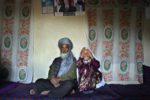The following has been cross posted at Muslim Lookout.
For a while now Sally Armstrong has been documenting the situation of women in Afghanistan through her books and documentary. She recently spoke at the University of Guelph fundraising breakfast and Guelph, Ontario’s Guelph Mercury covered the talk given by Armstrong – a journalist, it seems, on a mission.
Now anytime the idea of a non-Afghan, Western/Northern person trying to save Afghan women is presented, I can’t help but wonder if long lasting solutions are being sought, and usually they are not. The micro-level problems are highlighted at the expense of another culture and/or religion, while the macro-level causes of the problems are completely ignored and those who are at fault at the macro-level are rarely held accountable. Unfortunately, this is how this Guelph Mercury piece read. The Guelph Mercury reports that Armstrong is
swinging against the international political correctness that is keeping Afghan women under lock and key.
Together, Armstrong and the Guelph Mercury paint a bleak picture of the condition of women in Afghanistan.
Of the Taleban, Armstrong says
“They murder them [women] in public, in front of their children, by shooting them in the face”
Of the situation of women in Afghanistan the Guelph Mercury says:
And though there is a small but growing group of Afghan women who are working to improve conditions, there is still a lot of work to be done.
Eight years after the Taliban was brought down, women are still being kept behind walls, kept out of schools, kept in purdah and kept out of civil life, she said.
and:
Afghanistan is the only country in the world where the suicide rate is higher for women than it is for men.
About 85 per cent of the women are illiterate, a state they equate with blindness.
Though schools for girls have now opened, they receive no funding from the Afghan government
I do not doubt that situation for women in Afghanistan is dire. I do doubt, however, that the problem is as simplistic and black and white as is depicted by this oh-so-common narrative.
As much as I dislike the Taleban, and as much as I despise their view of women, I also recognize that even they are not the monolithic entity Western media depicts them as. To assume all Taleban members would do such horrendous things as shoot women in the face denies the possibility in our mindset and discourse that perhaps dialogue and educational opportunities could arise with at least some of them. It also is only one step away from generalizing about all Afghan, and even all Muslim, men.
Additionally, the men who make up the Afghan Taleban are Afghan men. The men who make up the Taleban are their men. They are the brothers, fathers, sons, cousins, etc., of the same women so many here in the West want to “save.” How will painting these men as monsters actually help Afghan women? Simply criticizing the Taleban’s actions with one sweep of the criticism brush does not help Afghan women at all and further alienates the men in their lives. We are not recognizing the relationships, as well as possible dependencies, Afghan women have with Afghan men. We are refusing to recognize that Afghan women may have male allies in their midst, or that some Afghan women may support the Taleban.
A better way to address the issue would be a less patronizing and more nuanced way. Understanding not only their cultural and religious context, as well as how they ended up as they are – a.k.a. colonization – would be necessary. The British (who created Afghanistan’s borders) forced opposing ethnic groups to live in one country, resulting in years of civil war and the subsequent devastation of the economy and education of the country. Russia’s and the U.S.’s imperialist invasions, and now the U.S.’s “war on terror”, have all had devastating effects on Afghanistan and its people. They have created situations and realities that make resources that we take for granted very difficult to attain in Afghanistan. As a result of such devastation, the women have suffered most, as is what usually happens.
If women in the West do want to help Afghan women, they would be better off questioning the tactics and purpose of their governments’ current “war on terror”, one of the effects of which has been the further radicalization of many young Muslim men who have felt targeted and victimized by this war. A war in which we too, as Canadians, are involved. To deny the role this war has played in worsening the situation of women in Afghanistan would be the real injustice. Therefore, as mentioned earlier, understanding the effects of this war on the people of Afghanistan, including on the situations and motives of the men of Afghanistan, is necessary in changing the situation. Since you criticize international political correctness, I would say that challenging your own government’s role in the perpetuation of these dire situations for Afghan women may be the truly non-politically correct thing to do, Ms. Armstrong.
Culture and patriarchy do indeed play a role, and they should be challenged as well. However, they are being challenged and resisted by the women of Afghanistan. The Guelph Mercury says that
…though there is a small but growing group of Afghan women who are working to improve conditions, there is still a lot of work to be done.
The work of these women should not be discounted. Organizations like RAWA have been working for Afghan women for decades. Additionally, if the country were not in a war with Western forces, then there would most likely be more such groups. However, years of civil war and foreign invaders and occupiers have made this difficult.
Although Armstrong, and people like her, may have good intentions, their approach comes across as insulting. Helping is not a bad thing. But it should not be done with the assumption that there is something wrong with the people one is helping. Both the assumption that the women one is helping just aren’t capable of helping themselves (instead of criticizing and trying to change the macro-level forces which may hinder them) and the assumption the men of that culture are all oppressive monsters taint any altruism with self-righteousness and condescention. And that doesn’t help anyone. To have real change macro-level factors, which hold back entire nations, need to be challenged, questioned, and changed. Otherwise, all other solutions will be temporary, as the people will still be facing macro-level oppressions.



